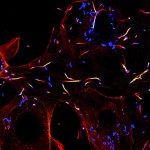Lien vers Pubmed [PMID] – 21810608
J. Immunol. 2011 Sep;187(5):2646-55
Some nonpathogenic bacteria were found to have protective effects in mouse models of allergic and autoimmune diseases. These “probiotics” are thought to interact with dendritic cells during Ag presentation, at the initiation of adaptive immune responses. Many other myeloid cells are the effector cells of immune responses. They are responsible for inflammation that accounts for symptoms in allergic and autoimmune diseases. We investigated in this study whether probiotics might affect allergic and autoimmune inflammation by acting at the effector phase of adaptive immune responses. The effects of one strain of Lactobacillus casei were investigated in vivo on IgE-induced passive systemic anaphylaxis and IgG-induced passive arthritis, two murine models of acute allergic and autoimmune inflammation, respectively, which bypass the induction phase of immune responses, in vitro on IgE- and IgG-induced mouse mast cell activation and ex vivo on IgE-dependent human basophil activation. L. casei protected from anaphylaxis and arthritis, and inhibited mouse mast cell and human basophil activation. Inhibition required contact between mast cells and bacteria, was reversible, and selectively affected the Lyn/Syk/linker for activation of T cells pathway induced on engagement of IgE receptors, leading to decreased MAPK activation, Ca(2+) mobilization, degranulation, and cytokine secretion. Also, adoptive anaphylaxis induced on Ag challenge in mice injected with IgE-sensitized mast cells was abrogated in mice injected with IgE-sensitized mast cells exposed to bacteria. These results demonstrate that probiotics can influence the effector phase of adaptive immunity in allergic and autoimmune diseases. They might, therefore, prevent inflammation in patients who have already synthesized specific IgE or autoantibodies.
